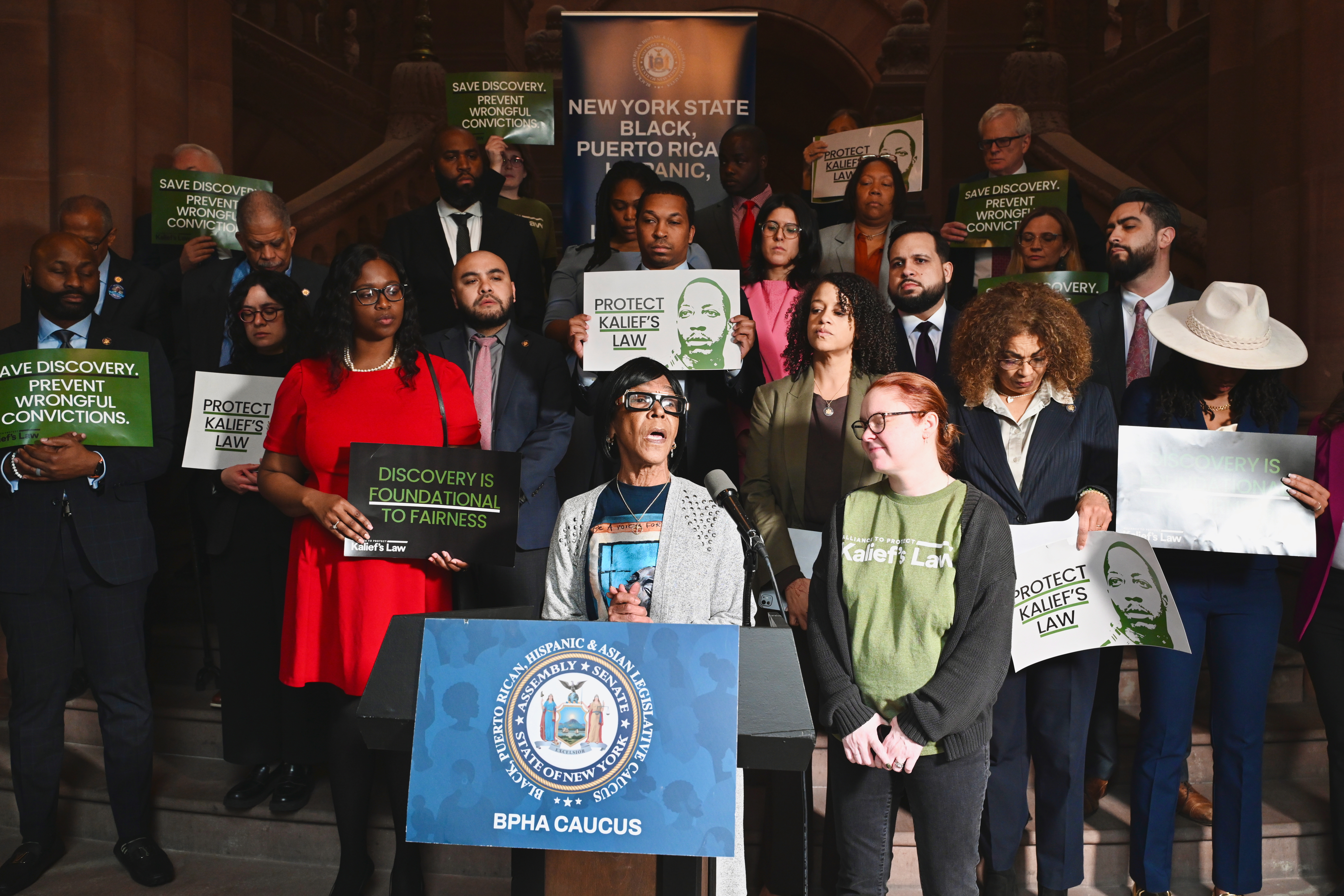
Exoneree Renay Lynch speaks at a press conference to protect Kalief’s Law in Albany on April 7, 2025. Image courtesy of The Bronx Defenders.
Ten years after Kalief Browder’s death, advocates successfully blocked a push to dismantle the law inspired by his story.
06.11.25 By Alyxaundria Sanford
Ten years following the tragic death of Kalief Browder, a Bronx teenager who spent three years at Rikers Island awaiting trial, public defenders, impacted families, community organizers, and policy advocates joined forces to protect a landmark 2019 New York discovery reform secured in his name.
Known informally as Kalief’s Law, the statute ensures people accused of crimes receive critical evidence early enough to defend themselves. Its passage was a pivotal move toward fairness, transparency, and due process — especially for poor, Black, and brown New Yorkers disproportionately harmed by the criminal legal system.
Yet, during state budget negotiations this year, lawmakers faced intense pressure to repeal Kalief’s Law from prosecutors and Governor Kathy Hochul, who argued that it was too burdensome and caused case delays. Their proposed changes would have gutted the timelines and requirements that hold prosecutors accountable, and would have reversed progress in New York by potentially reopening the door to indefinite pretrial detention, last-minute evidence dumps, and cases built on secrecy rather than fairness.
At the center of the fight against these rollbacks were the Alliance to Protect Kalief’s Law, a coalition of organizations that includes the Innocence Project; Akeem Browder, Kalief’s older surviving brother and founder of the Kalief Browder Foundation; and Renay Lynch, a recently exonerated New Yorker.

Exoneree Renay Lynch speaks at a press conference to protect Kalief’s Law in Albany on April 7, 2025. Image courtesy of The Bronx Defenders.
To preserve Kalief’s Law, advocates worked tirelessly to ensure that legislators had a full understanding of New York’s discovery laws, especially the successes of the 2019 reforms. The Alliance to Protect Kalief’s Law maintained a steady presence in Albany throughout the entire, protracted budget season, armed with written materials to share and answering questions from lawmakers and staffers. Buoyed by this advocacy, the legislature held fast, preserving the core timelines and transparency mandates of the 2019 law — ensuring its integrity and impact remained in place. When the final state budget was signed in May, Kalief’s Law remained largely intact.
“We know that evidence-sharing does not threaten public safety. True safety comes from investments in housing, healthcare, education, and community — not from stripping away fundamental fairness and transparency,” the Alliance to Protect Kalief’s Law said in a statement.
In May 2010, Mr. Browder was just 16 years old when he was arrested for allegedly stealing a backpack. His family’s inability to pay his $3,000 bail and the lack of access to the state’s evidence against him prevented him from effectively challenging the charges against him and securing his timely release. He spent more than 1,100 days incarcerated before he was released in 2013. Two years later, he died by suicide.
“For decades, New Yorkers accused of crimes languished in jail without ever seeing a shred of the evidence against them, just like Kalief Browder,” said Amanda Wallwin, a state policy advocate at the Innocence Project. “Mr. Browder’s story was shocking not because his experience was unusual, but because he refused to give up and plead guilty to a crime he didn’t commit. This year, New Yorkers demonstrated that they refuse to go back to the laws that led to tragedies like Mr. Browder’s death.”
In light of this victory, Ms. Wallwin and the Innocence Project’s policy team remain committed to defending and expanding reforms that create a fairer system for all.
“The constitutional promise of the presumption of innocence can never be realized without strong statutory protections against wrongful accusations,” she said.
With your support, we can continue the work to prevent wrongful convictions — not just in New York, but nationwide.
Thank you for visiting us. You can learn more about how we consider cases here. Please avoid sharing any personal information in the comments below and join us in making this a hate-speech free and safe space for everyone.
June 13, 2025 at 8:53 am
June 13, 2025 at 12:15 am
MUCH PRAISE FOR DOING THE
WORK + HAVING THE
COMPASSION
* THAT SUSTAINS YOU *
Thank God for all the supporters of Kaliefs, law❣️My heart breaks for what they did to Kalief and his family 💔😡 We NEED LAWS that hold those accountable for tragedies they inflict upon the accused, especially the innocent accused!!!